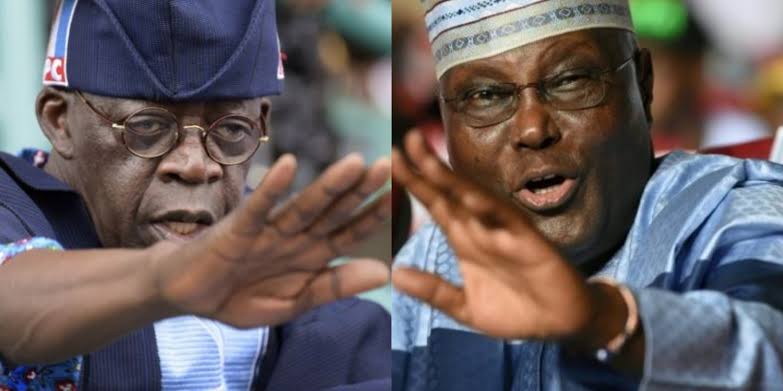National Alliance for Atiku and Okowa, a political support group has disagreed with the stand of the All Progressive Congress ( APC ) Presidential candidate on his stand on rising inflation.
The group while addressing the press in Abuja, said Tinubu urgently need to go back to school and study economics to understand the subject matter of inflation.
Recall that the the Central Bank of Nigeria (CBN) has raised the interest rate to arrest the sharp rise in inflation which rose in August to 20.52 per cent from 19.64 per cent in the previous month, the highest in 17 years.
Nigeria’s apex bank has raised interest rates three times in 2022. It first raised the rates to 13 per cent in May, 14 percent in July and 15.5 percent in October, the highest ever since 2006.
The All Progressives Congress (APC) Presidential candidate, Asiwaju Bola Ahmed Tinubu, has said raising interest rates is not the solution to rising inflation.
In his manifesto tagged, “Renewed Hope”, Tinubu said the current increasing inflationary trend was caused essentially by global supply disruptions, saying addressing it is not by increasing the interest rates.
But the group while reacting said “We totally disagree with Tinubu Stance on Inflation due to the core reason.”
“Inflation is the increase in the price of goods and services in an economy. It translates to reducing the purchasing power of a currency. Measured by the Consumer Price Index (CPI), Inflation shows the impact of price changes for various products and services; it provides a single value representation of the increase in prices. “
“For any economy, inflation is a complicated phenomenon. While moderate inflation is suitable, it can create a disastrous economic situation if it exceeds a certain level. Here’s what causes inflation, how to curb it and what measures a government can take to control it”.
The group further listed different factors affecting inflation in an economy as follows
A- Growing Economy and Money Supply:
When the money supply increases, liquidity rises, people’s purchasing power grows, and therefore, they’re willing to spend on necessities and luxuries. The increased demand for goods and services allows suppliers to raise prices. While an increased money supply may sound good, it also has its drawbacks, like devaluation of the domestic currency and contributing to inflation.
B- Disruption in Supply: When there is increased demand, the supply chain is negatively affected due to various factors. For example, during the pandemic, the supply of many goods was disrupted as customers were unwilling to spend much. When there is demand-supply parity, the prices of goods and services increase as there is a shortage.
C- Poor Government Policies: The government must take specific measures to restrain the demand to a certain level. Inefficient decisions like not adjusting the interest rates in line with inflation every year, not managing the money supply within the country, among others, all lead to the inflation rate rising beyond control.
The group also stated some factors that are influencing inflation in Nigeria:
A- Crude Oil Prices: The oil price shock has significantly contributed to the rising inflation in all oil-importing countries. In recent years, there have been a good number of fluctuations in oil prices, which has also led to high volatility in the commodity market. The increased inflation rate in April 2022 was primarily due to the costs of crude petroleum, natural gas, mineral oils, and essential metals. The fuel and light retail prices increase was 10.80% in April this year compared to 7.52% in March.
Brent crude was trading at $120 per barrel levels from March-June, hitting $139 per barrel, the highest since June 2008. With the fall in demand for crude and the rise in recession fear, the price sank to $99.9 per barrel.
B- Russia Ukraine War: The retail Inflation rose mainly because of the rising prices of food and other essential items. Nigeria, imports a significant portion of sunflower oil from Ukraine, which is the major exporter of this commodity. Moreover, Ukraine is also a substantial exporter of fertilizers for Nigeria. Due to war situations, uncertainties, and trade cut-offs, there has been a supply shortage in these commodities instead of a never-ending rise in demand. This deficit in demand and supply has further induced the inflation of essential items.
Naira Depreciation: For over a decade, the rupee has depreciated against the US dollar. It has seen a fall of more than.
How Can the Government Control Inflation?
Being an import-oriented country, Nigeria has to purchase (import) raw materials and other goods at a higher price due to higher dollar value. Importing at a high cost increases the cost of production, leading to higher costs of the final goods or services, thereby causing Inflation in the Consumer Price Index.
The government uses monetary and fiscal measures to control Inflation.
Monetary Policies .
One significant monetary way to curb Inflation is to control the money supply in the economy. If the money supply goes down, the demand for goods will reduce, causing a price fall. Another way to curb the money supply is when the government withdraws specific paper notes or coins from circulation. Lowering the lending rate for commercial banks allows money circulation to be controlled. The Central Bank can also block commercial banks’ money by issuing government securities.
This helps slow economic growth by making credit more expensive, which reduces consumer and business spending.
Higher interest rates on government securities also slow growth by incentivizing banks and investors to buy Treasuries, which guarantee a set rate of return, instead of the riskier equity investments that benefit from low rates.
C – Fiscal Policies
The two essential components of a fiscal policy are government revenue and expenditure. The government can change its tax rates to increase revenue or efficiently manage expenditure. An inflationary gap is created when the demand is higher than the supply. The government can tackle this in two ways.
One, by decreasing the overall government expenditure and transfer payments. Two, increasing the tax rates leads to decreased individual demand and a drop in the economy’s money supply.
Bottom Line
Given the excessive volatility in global crude oil prices since late February, inflation is likely to remain volatile. The rate is contingent upon future oil and commodity price developments. Considering CBN past measures, we can also successfully predict Nigeria central bank taking additional rate hike measures to reduce inflation within acceptable limits.



